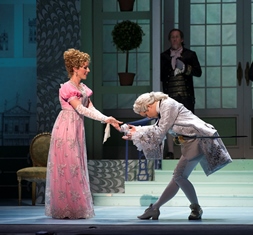
Cincinnati Opera's "Rosenkavalier" Worth the Wait
“Ja, ja,” (“yes,
yes”) sighs Marie Thérèse, Princess of Werdenberg, known as the Marschallin, as
she exits the stage with Herr Faninal at the conclusion of Richard Strauss’
“Der Rosenkavalier” (“The Knight of the Rose”). It is time to let her young lover Octavian go.

"Der Rosenkavalier, second production of Cincinnati Opera's 2013 summer festival, which opened Thursday night at Music Hall, is a youth-will-be-youth, boys-will-be-boys, life-is-short affair, with a serious edge. Not staged by the Opera since 1994, it made for an impressive revival -- lengthy for a week night (four hours, counting two intermissions), but eminently rewarding, start to finish..
Hugo von Hofmannsthal’s libretto seeks to recapture the spirit of Empress Maria Theresa’s Vienna in a 20th-century musical context, complete with the yet-to-be crafted Viennese waltz, which evokes another Strauss entirely, Johann Strauss Jr. and his family.
Identities are an issue in the plot of “Rosenkavalier,” too. Seventeen-year-old Octavian dons a chamber maid’s clothing when his act I tryst with the Marschallin is about to be discovered by the sudden visit of Baron Ochs von Lerchenau, the Marschallin’s country cousin. The boorish Ochs immediately takes a fancy to the maid (Mariandel/Octavian). And there are other hijinks throughout this well-loved romantic comedy: Ochs carries out an assignation with Mariandel, despite his engagement to Sophie Faninal. Through the machinations of Octavian and a pair of Italians-for-hire, Valzacchi and Annina, Ochs is caught in the act by Sophie’s father (Herr Faninal), who agrees to call off the marriage in view of Och’s unseemly behavior. All this to the relief of Sophie and Octavian, who have fallen in love and wish for nothing more than to foil her marriage to Ochs.
The knight of the rose is Octavian. It was a custom in Vienna at the time for a suitor to have a silver rose delivered to his intended as a symbol of their engagement. Ochs arranges through the Marschallin for Octavian to make the presentation, thus setting the train of events on their hilarious course.
All of this transpired on an attractive set (purchased from Indiana University) with many decorative touches. Panels bearing black and white images of period architecture framed the stage, chandeliers topped the Marschallin’s bedroom, matching staircases rose from Herr Faninal’s elegant salon, and the wood-framed inn in act III, site of Ochs’ intended seduction of Mariandel -- Octavian in disguise to trap Ochs -- was furnished with hidden windows and doors to help further Octavian’s plot.
Conductor Christof Perick led the Cincinnati Symphony
Orchestra in his Cincinnati Opera debut. And, indeed, the performance of the
CSO was one of the great strengths of the production. Though largely depending
upon where one sat in Music Hall, the orchestra overwhelmed the voices now and
then. Still, it was truly gratifying to hear Strauss’ luxuriant score so
beautifully played, not least during the sparkling, magical music for the
presentation of the rose in act II, where members of Faninal’s household watched frozen with awe. (Speaking of roses, a bouquet of yellow roses stood in the box occupied by the late Louise Nippert, whose generous gifts to the CSO and the Opera has made its continued participation as official orchestra for Cincinnati Opera possible.)
The voices were well matched and well chosen. Soprano Twyla Robinson as the Marschallin projected both the vulnerability and the strength of her character as a woman no longer young, but in love, while mezzo-soprano Ruxandra Donose as Octavian/Mariandel was alternately spunky and sweet, as her changing roles required. Soprano Sarah Coburn was a standout as Sophie, her dulcet voice blending perfectly with Donose as Octavian. The three came together exquisitely in the climactic trio in act III, Hab’ mir’s gelobt, ihn lieb zu haben” (“I made a vow to love him”) where the Marschallin yields Octavian to Sophie.
Bass Rúni Brattaberg as Ochs (German for “ox”) was a buffo triumph (only his difficult lowest notes did not project). He boasted boorishly of his sexual prowess, cried bloody “Moerder” (“murder”) when pricked with Octavian’s sword in Act II, and he owned the opera’s famous waltz as he comforted himself in anticipation of his tryst with Mariandel.
Roles by tenor Richard Clement and mezzo-soprano Fredrika Brillembourg as Valzacchi and Annina were well sung and vividly acted, as was that of baritone Hans-Joachim Ketelsen as Faninal and Meghan Tarkington as Sophie’s nurse Marianne. In a splendid cameo role, tenor Marco Panuccio sang the Italian Singer in act I, soaring easily to his high D’s and storming indignantly offstage when interrupted by Ochs.
In another (non-singing) cameo role, six-year-old Aiyana Hawkins as the Marschallin’s young servant Mohammed reprised the role her father Marvin Hawkins performed with the Opera in 1986, striding confidently and engagingly across the stage to serve the Marschallin her breakfast and retrieve Sophie’s handkerchief at the end.
“Der Rosenkavalier” is more than a farce. With the Marschallin’s discourse on age, recognizing that Octavian will tire of her “heut oder morgen” (“today or tomorrow”) and her magnanimous response when it happens all too soon, it paints a noble portrait. Life will bring trials. The difference is “in dem wie,” “in the way” one bears them.
Repeat is 7:30 p.m. Saturday at Music Hall. Tickets begin at $25. Call (513) 241-2742, or order online at www.cincinnatiopera.org